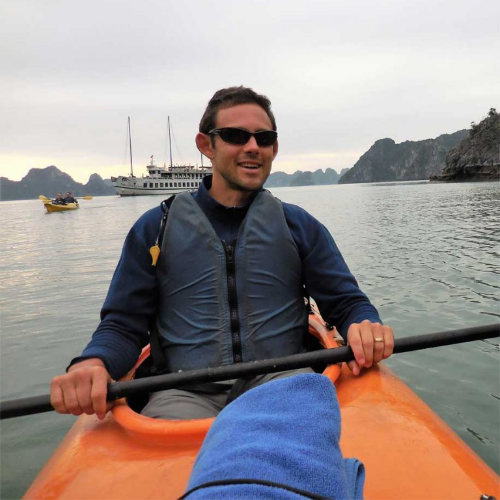URI assistant professor of natural resource science, Brain Gerber shares his advice for students and his story. PHOTO CREDIT: URI.edu
Brian Gerber has had an extensive biological career prior to becoming an assistant professor in the department of natural resource science.
Before coming to the University of Rhode Island, Gerber traveled around the world as a conservation biologist, studying and documenting numerous species and the interactions within their ecosystems.
“I’ve always had this interest in the natural world and how wild animals survive,” Gerber said. “You could spend every lifetime forever to try and understand how the world works, and it’s just fascinating.”
Gerber earned his master’s degree at Virginia Tech, where he joined a fellow researcher in studying possums as his first professional experience with the field. After this, he earned his doctorate in fish, wildlife and conservation biology from Colorado State University.
He has studied multiple classes of species in his research, such as birds and amphibians, but current his work focuses mostly on mammals. Specifically, he works with species of mammals that are endangered in their native habitats due to various issues such as climate change.
Through his work, Gerber is also able to incorporate exploring the world during his individual and joint graduate student projects. He has done fieldwork with colleagues to study the Javan rhino in Indonesia, Bengal tigers and red pandas in India and fossa in Madagascar.
“Now I don’t have time to do all that fieldwork and sit, so graduate students get to do that,” Gerber said. “We work as a team and that’s where it’s really exciting for this kind of work.”
Gerber has taught many courses at the University, but some of his recent courses have included NRS 330G: The Biodiversity Crisis, NRS 402: Quantitative Wildlife Ecology, and NRS 520: Quantitative Techniques in Natural Resource Research.
“We oftentimes hear about climate change, but you can’t solve climate change without solving the biodiversity crisis and vice versa,” Gerber said. “It gets people to think about social justice issues and conservation biology.”
According to him, teaching is not only one of the hardest professions, but it can = be extremely rewarding when you can see students growing.
“There’s not a lot of jobs like being a professor,” Gerber said. “It’s an interesting mix.”
Gerber provided advice for prospective students who are looking to be more involved in their studies.
“Try everything,” he said. “It’s not easy to get these experiences and so, the sooner you can when you have a little flexibility, the better.”
He also advised students to look into volunteer opportunities to figure out what areas of the field they are interested in. Reaching out to various agencies and taking the first step in forming a connection is a great way to get your foot in the door, according to Gerber.
“There’s so many angles to the field,” he said. “[You] just gotta kind of find out what you really love.”
Mallory Lentz, a senior wildlife and conservation biology major, took NRS 330G: The Biodiversity Crisis with Gerber last fall.
“Dr. Gerber was able to bring a sense of community and hope to the otherwise sad and isolating subject matters,” she said. “I admire his passion for conservation.”
She said that Gerber is able to portray difficult topics with ease and gets students excited about the part you can play in improving our world. According to her, Gerber really motivated her as a conservation biology student towards making an impact in the world and saving our planet.





